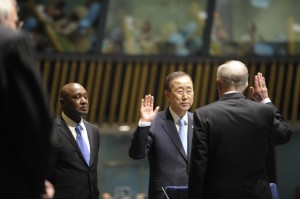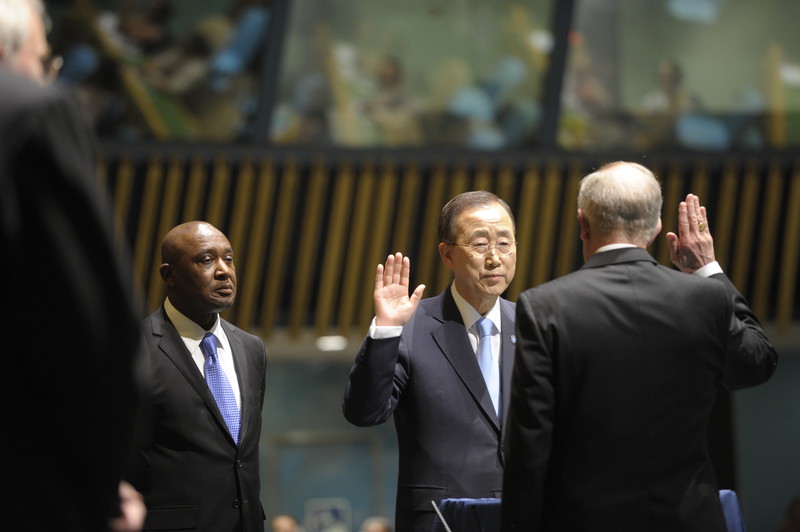 While Israel increases its use of arbitrary arrest and detention as a tool of political repression against Palestinians, the British corporation G4S is continuing to profit from its contracts with the Israeli prison system. So why is the United Nations one of the firm’s customers?
While Israel increases its use of arbitrary arrest and detention as a tool of political repression against Palestinians, the British corporation G4S is continuing to profit from its contracts with the Israeli prison system. So why is the United Nations one of the firm’s customers?
Six Palestinian human rights organizations recently wrote to UN Secretary General Ban Ki-moon, urging him to end the UN’s contracts with G4S. In their letter, the groups argue that the UN’s own policies and standards should bar its relationship with G4S because of the security firm’s complicity in human rights abuses and violations of international law.
G4S’s links to Israeli apartheid have been well documented. In 2007, G4S signed a contract with the Israel Prison Service to provide technology and services to Israeli prisons, including Ketziot, Megiddo and Damon, where Palestinian political prisoners are held, often in administrative detention based on secret evidence and without charge or trial.
The detention of Palestinians from the occupied West Bank or Gaza Strip in prisons inside Israel is a violation of the Fourth Geneva Convention.
G4S provides services to Ofer prison in the West Bank, where Palestinians are tried in an Israeli military court and to the Kishon and Russian Compound detention and interrogation facilities, where systematic torture has been documented.
G4S also provides equipment and services to Israeli checkpoints that form part of the route of Israel’s wall in the West Bank.
Tool of repression
Israel has long used arbitrary arrest and incarceration as a tool of repression against Palestinians, but the rates of arrest and detention have dramatically increased since Israel’s attacks on Gaza last summer. As of April 2015, Israel was holding 414 Palestinians in administrative detention, more than double the number held at the same time last year.
These are the highest rates of administrative detention reported since 2009.
Ravina Shamdasini, a spokesperson for the UN High Commissioner on Human Rights, expressed concern over this issue in April. Shamdasini called on Israel to “end its practice of administrative detention and to either release without delay or to promptly charge all administrative detainees and prosecute them with all the judicial guarantees required by international human rights law and standards.”
The United Nations, through its various agencies, has listed contracts with G4S in at least 24 different locations around the world.
The UN’s children fund UNICEF, the UN refugee agency UNHCR, the UN Development Programme and the cultural organization UNESCO are among the agencies that use G4S services.
In 2014, UNHCR listed $1.3 million in contracts awarded to G4S in Jordan for “security/safety services,” and almost $2 million more in Kenya and India.
Abhorrent
In September 2014, human rights worker Kali Rubaii noticed that G4S was providing services to the UNHCR offices in Amman, and later found the firm guarding the UN Development Programme’s offices, too. Rubaii and the organization Friends of Sabeel North America wrote to Ban Ki-moon about this matter, but received no response.
This is especially alarming since the contracts have been renewed — or fresh contracts were signed — in February this year. This suggests that UN decision-makers have awarded the contracts despite knowing G4S’s abhorrent track record.
Clearly, the UN has a case to answer when it ignores its own standards.
The UN has a detailed set of standards for contract procurement.
One such set — the “supplier code of conduct” — states that “The UN expects its suppliers to support and respect the protection of internationally proclaimed human rights and to ensure that they are not complicit in human rights abuses.”
The UN’s guiding principles on business and human rights assert that “states should promote respect for human rights by business enterprises with which they conduct commercial transactions.”
G4S was even named as a firm complicit in Israel’s human rights abuses by Richard Falk during his stint as a UN special rapporteur on human rights in Palestine.
So why has the UN not ditched G4S?
Common cause
In April 2012, some 2,000 Palestinian political prisoners launched a mass hunger strike calling for an end to Israel’s use of administrative detention. In solidarity, Palestinian organizations called for action and launched an international campaign — #StopG4S — to hold the security firm accountable for its complicity with Israeli colonization and the incarceration of Palestinians.
At that time, G4S was already the target of protest by groups around the world calling attention to G4S abuses in private prisons, refugee removal centers and deportations in the UK, the US, South Africa and Australia.
Boycott, divestment and sanctions campaigners found common cause with these campaigns. In the UK, the Stop G4S Coalition was formed; it has organized protests at the G4S annual shareholders meeting for a number of years.
Campaigning works. Recently, we’ve seen universities, charities and trade unions across the world cancelingcontracts worth millions of dollars with G4S over its role in human rights abuses in Palestine. The Bill and Melinda Gates Foundation sold its $187 million stake in the company last year came after worldwide pressure to divest. The growing pressure on G4S to abandon its involvement in human rights violations has put the company on the defensive and prompted it to announce that it will end some aspects of its involvement in Israel’s prison system and its illegal settlements. However, the company has yet to end its complicity with the Israeli apartheid system.
We know the Israel Prison Service and G4S can’t be trusted to act on their own but we’ve seen what happens when campaigners and activists come together. The case of South African apartheid provides a historical lesson showing that big changes can come from sustained public action to force the hands of those in power.
If powerful international bodies like the UN are serious about human rights, can they really continue to deal with G4S? We think not.
By awarding contracts to G4S, the UN has sent a message that the Israeli apartheid regime can continue to conduct business as usual with impunity.
Ryvka Barnard is the senior global justice campaigns officer at War on Want.
Riya Hassan is Europe campaigns officer for the Palestinian Boycott, Divestment and Sanctions National Committee (BNC).
Source: EI
